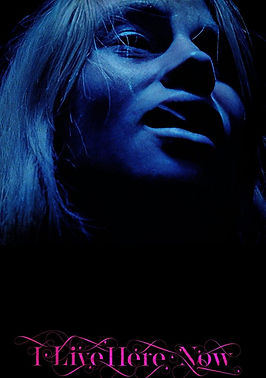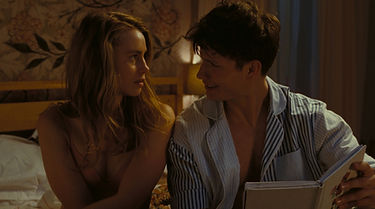
I Live Here Now
Director: Julie Pacino
Starring: Lucy Fry, Madeline Brewer, Matt Rife, Sarah Rich, Lara Clear, Cara Seymour
Julie Pacino’s feature debut, I Live Here Now, follows Rose (Fry), a struggling actress who, after a lifetime believing she’s infertile due to a botched childhood surgery, becomes unexpectedly pregnant. In a bid to escape her controlling boyfriend, Travis (Rife), and his even more domineering mother, Martha (Lee), she checks into the eerie Crown Inn, a backwoods motel seemingly cut off from time and space. There, she encounters three mysterious women—Sid (Rich), Lillian (Brewer), and Ada (Clear), who each seem to know more about her life, mind, and body than she does.
"Too often, the film feels like it’s being cryptic just for the sake of it. Throughout, clues and symbols would come and go - keys, scripts, bruises, missing pills - but rarely with satisfying payoffs."

I Live Here Now is an ambitious, surrealist dive into female identity, trauma, and creative autonomy, told through a fractured lens of psychological horror and stylised symbolism. It’s a film full of ideas, but one that struggles to fuse emotionally or narratively, leaving its mystery often feeling more muddled than meaningful.
Pacino, though, clearly isn’t afraid to take risks. The film is layered with themes around identity, control, trauma, and womanhood, and it’s clear she wanted to make something bold and deeply personal. There’s also a clear Lynchian vibe to the film; it's hard not to think of Inland Empire or Mulholland Drive (or Twin Peaks!) while watching this, but this doesn’t feel like a send-up; instead, it pays homage. She isn’t afraid to take her story to strange, uncomfortable, or abstract places either, and it’s hard not to respect that from a debut offering.
Though admittedly the story was hard to follow, I Live Here Now is absolutely a film that invites interpretation, for better or worse. Sid, Lilian, and Ada seem to represent different sides of Rose’s psyche or stages of her trauma, and the kooky motel that they all share in common becomes a kind of purgatory. The central mystery is definitely ambiguous, almost certainly deliberately, though I found the mystery kept me at arm’s length because of this, rather than drawing me further in. Too often, the film feels like it’s being cryptic just for the sake of it. Throughout, clues and symbols would come and go - keys, scripts, bruises, missing pills - but rarely with satisfying payoffs.
Alongside the mystery and the themes, the film also felt a little hollow. Rose didn’t always feel like an actual person. Her pain is there, but it’s filtered through so many layers of metaphor and surrealism that it was hard to connect with her on a human level. That said, Lucy Fry did not put a foot wrong in her performance; she is eminently watchable in the role and committed fully. Brewer, also, was compelling to watch as the kind of ‘devil on the shoulder’ character.
The film hits that sweet, sweet ninety-minute runtime, but the pacing felt awry at times, leading to the feeling that the film was dragging at points. Could it have been more effective with some of the excess strangeness trimmed away? Maybe.
However, it’s hard to deny that I Live Here Now is beautiful to look at - Pacino and cinematographer Aron Meinhardt have crafted a delicious-looking film here. Shot on 35mm and 16mm film, the film has this rich, tactile quality that pulls you into its surreal, dreamlike world. The Crown Inn feels both cinematic and creepy, like you’ve stumbled into the subconscious of someone on questionable substances.
I Live Here Now is a bold, polarising debut that will undoubtedly speak to some viewers on a subconscious, feminist, or symbolic level. But for others - especially those who want more clarity, connection, or emotional payoff - it may feel like style drowning in abstraction. It’s as if Julie Pacino wanted to make her own Inland Empire, but without David Lynch’s intuitive mastery of disorientation - but the signs are there that she can confidently carve her own path. Visually rich and thematically ambitious, but emotionally opaque and narratively unfocused, this is a promising debut, but one that stumbles under the weight of its own symbolism.

July 25th 2025






